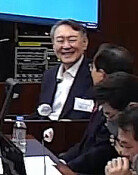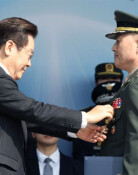Let’s Consider Business Groups’ Proposal Seriously
Let’s Consider Business Groups’ Proposal Seriously
Posted May. 11, 2001 09:15,
It is not desirable that the government and business circles should stand in opposition of one another, as the restriction on conglomerates’ equity in subsidiaries system became revived only after three years.
Although the business circles strongly requested for the elimination of various regulations, the government did not take their demand seriously by criticizing it as an effort to go back to the old system.
It is not a good time to amplify the conflict between the government and the business circles when the nation’s economic condition is not in a good shape. As the government and business circles will hold a meeting on May 16th to discuss the business circles’ proposal, the government will have to take into consideration their reasonable demands.
The government acknowledges that quite a few regulations, which were implemented during the economic crisis, does not adequately fit the capital market system and it unnecessarily hamper the business activities. Although restrictions on Chaebol is necessary to alleviate the unreasonable expansion and concentration of economic power, they should not be excessive enough to destruct the power and the function of the market. If certain demands proposed by the Federation of Korean Industries (FKI) aggravate the companies’ situation, the government should actively wrestle with them.
One of the demands is to eliminate the restriction on conglomerates’ equity in subsidiaries which limits the company’s investment to the 25 percent of equity. This system was introduced in 1987 in order to monitor the controlling power of Chaebol’s chairperson and the company’s expansion. Due to many rules of exception, this system failed and was eliminated in 1998. Due to the 1999 reform, the business circles have to resolve their excess equity in subsidiaries by next March, giving up new business expansion and liquidating the existing business through the clearance sales.
The business circles argue that, in reality, this system shrinks the creative and active investment which no company is willing to invest business that lacks profitability and future-value even with the government’s encourage. Since the foreign companies are not restricted by this system, it is the true that the domestic companies are counter-discriminated.
The side effects have occurred from the system, which requires the debt rate of 200 percent regardless of business type.
The business circles also should not disparage the government’s effort to secure the fairness without critically reflecting on what has brought about these restrictions. FKI should propose a reasonable and feasible alternatives while recognizing that negative views on Chaebol’s management are yet to be terminated.




![두쫀쿠가 뭐라고…영하 8도에 아이들 1시간 줄세운 어린이집 [e글e글]](https://dimg.donga.com/c/138/175/90/1/wps/NEWS/IMAGE/2026/01/09/133126969.3.jpg)
![지하철 타고 가는 북한산성…외국인도 반한 ‘K등산 맛집’[전승훈 기자의 아트로드]](https://dimg.donga.com/c/138/175/90/1/wps/NEWS/IMAGE/2026/01/10/133120824.1.jpg)

